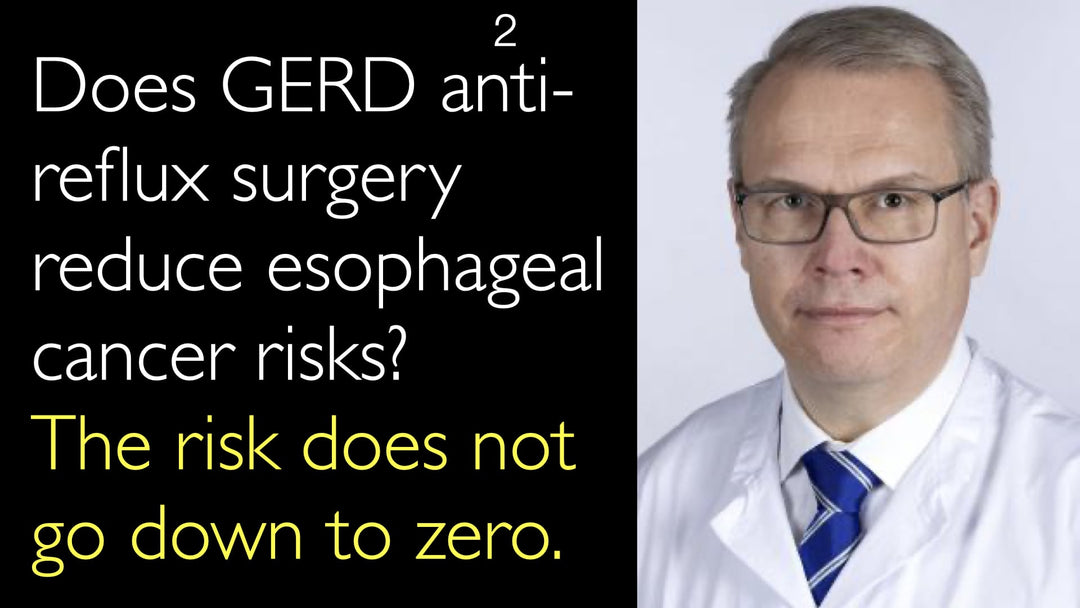Leading expert in esophageal surgery, Dr. Jari Rasanen, MD, explains how anti-reflux surgery reduces but does not eliminate esophageal cancer risk. He details a key study showing oxidative stress in the esophageal mucosa persists after surgery. Dr. Jari Rasanen, MD, emphasizes that ongoing inflammation is a critical indicator of cancer risk. Patients require continued monitoring with biopsies even after a successful procedure.
GERD Surgery and Esophageal Cancer Risk: What Patients Need to Know
Jump To Section
- Reflux Surgery and Cancer Risk
- Oxidative Stress Study Findings
- Surgery Indications for Symptoms
- Ongoing Inflammation and Biopsies
- Individual Risk Factors
- Full Transcript
Reflux Surgery and Cancer Risk
Anti-reflux surgery for GERD does not completely eliminate the subsequent risk of esophageal carcinoma. Dr. Jari Rasanen, MD, clarifies that the procedure reduces the risk but does not bring it down to zero. This is because the disease process in the esophageal mucosa may have already started from long-term reflux. The protective effect of the operation is therefore not absolute.
Oxidative Stress Study Findings
Dr. Jari Rasanen, MD, references a pivotal study published 15 years ago. The research focused on patients who underwent anti-reflux surgery for severe GERD. It measured levels of oxidative stress in the esophageal mucosa before and after the procedure. The results showed a significant reduction in oxidative stress post-surgery. However, the study proved that oxidative stress levels were not reduced to zero.
This finding provides biological proof that the risk for esophageal cancer persists. Dr. Jari Rasanen, MD, notes this is crucial for patient understanding and long-term care.
Surgery Indications for Symptoms
The primary modern indication for anti-reflux surgery is symptom control. Dr. Jari Rasanen, MD, explains that surgery is considered when medication fails to manage GERD symptoms effectively. The goal is to improve a patient's quality of life by stopping acid reflux. It is not a guaranteed preventative measure against cancer development.
Dr. Anton Titov, MD, discusses this important distinction with Dr. Jari Rasanen, MD. Patients should not view the surgery as a complete cancer prevention strategy.
Ongoing Inflammation and Biopsies
Monitoring for ongoing inflammation is essential after anti-reflux surgery. Dr. Jari Rasanen, MD, stresses the importance of taking biopsies from the esophageal mucosa. The presence of inflammation after a successful operation is a clear sign that cancer risk remains. This does not mean the surgery was ineffective at reducing risk.
It means that vigilant follow-up care is necessary. Regular endoscopic surveillance helps manage this residual risk.
Individual Risk Factors
It is impossible to predict an individual's cancer outcome after anti-reflux surgery. Dr. Jari Rasanen, MD, states that the risk reduction is a statistical phenomenon seen across populations. For a single patient, other factors must be assessed to gauge personal risk. The state of the esophageal mucosa is the most critical factor to evaluate.
Dr. Anton Titov, MD, and Dr. Rasanen agree this is a vital message for patient communication. Managing expectations is a key part of the treatment process for GERD.
Full Transcript
Dr. Anton Titov, MD: If somebody has an anti-reflux surgery, does that eliminate the risk of subsequent esophageal carcinoma? Does that reduce the risk? On what factors does the risk for esophageal carcinoma depend on after anti-reflux surgery?
Dr. Jari Rasanen, MD: The problem is that if somebody has had GERD reflux in his esophagus for a very long period, then he ends up having anti-reflux surgery. So the protective effect of anti-reflux surgery isn't complete. It reduces the risk, but the process, which has already started in the mucosa of the esophagus, can still go on. It can still cause esophageal cancer.
We published a study about 15 years ago, where we researched patients who had anti-reflux surgery. We looked at oxidative stress. We proved that although the mucosal oxidative stress was significantly less after anti-reflux surgery, it was not reduced to zero. So basically, this is a proof that the risk for esophageal cancer is still there after successful anti-reflux surgery.
But if the indication for anti-reflux surgery nowadays seems to be more control of the symptoms if you cannot control symptoms with medication, then you need to have anti-reflux surgery. So you really cannot say to the patient that it's guaranteed that there will be no cancer after anti-reflux surgery.
Dr. Anton Titov, MD: This is very interesting. Anti-reflux surgery is used to control symptoms of gastroesophageal reflux disease. Does that still reduce the risk of esophageal carcinoma? Or does the cancer risk stay the same from a statistical point of view?
Dr. Jari Rasanen, MD: Well, that's a little bit unclear based on our studies. But it seems that the risk of esophageal cancer is reduced. But it's not reduced to zero. So it means that it's impossible to say to an individual whether he or she will develop esophageal cancer after anti-reflux surgery.
So basically, it's other factors what you need to look at. That is the inflammation in the mucosa. You need to take biopsies from the esophageal mucosa. You look at the inflammation. If the inflammation is still there after the anti-reflux surgery, that's a sign that there is still a risk for esophageal cancer.
It doesn't mean that anti-reflux surgery wouldn't decrease the risk for cancer, but it won't make it zero. This is important for patients with gastroesophageal reflux disease.




